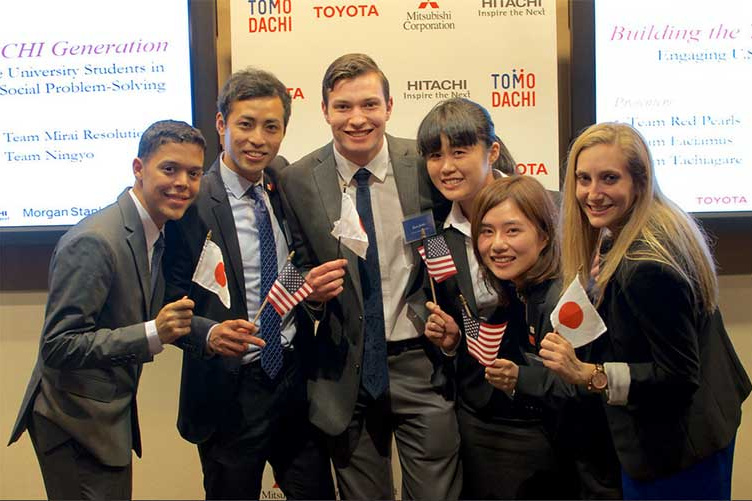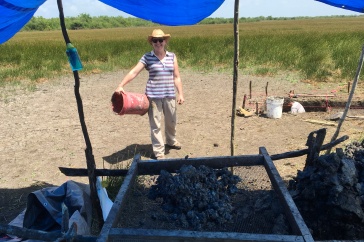
Ryan Justice '17 (third from left) and his Ningyo teammates will head to Japan in August.
In the years that have passed since the 2011 Tōhoku earthquake and tsunami, the Building the TOMODACHI Generation program has brought together students from the United States and Japan to create projects to address the challenges that still plague the region.
This year’s final projects were presented in February, and the first-place team, Ningyo, includes UNH student Ryan Justice '17.
“The TOMODACHI program allowed us to not only learn how to quickly work as a team with people from different backgrounds, it allowed us to form a family in the process, with each of us working toward a common goal: to help save the Tōhoku region,” he explains.
Ningyo and second-place team Tachiagare will travel to Japan in August to share their projects with the communities they seek to serve. For Justice and his Ningyo teammates, that community is Onagawa, where their project focuses on restoring a fishing industry decimated by the tsunami.
“Being an international business and economics student, this was a perfect opportunity for me to become involved in something that I love to do.”
Justice learned about the program through the The Washington Center, where he is currently an intern working with a law process serving firm. He is also taking an evening course in international organizations and humanitarian law.
“Being an international business and economics student, this was a perfect opportunity for me to become involved in something that I love to do,” he says. “Working with peers who come from different backgrounds and being able to effectively break down cultural differences in order to achieve a common goal is something I believe is essential in today’s globalized market.”
Justice’s participation in the Building the TOMODACHI Generation program began with lectures for the 15 students selected from The Washington Center. Next, 20 Japanese students arrived in the U.S., and the participants were divided into teams.
“Each team was tasked with designing a project for their assigned town that would help their town continue to make strides toward full recovery from the lasting effects of the tsunami,” Justice explains. “The project needed to focus on potential nonprofit, government and local partnerships and also needed a realistic budget to function on.”
In Onagawa, the fishing market continues to struggle, and many young people are leaving the community for larger cities.
To address the ongoing issues, the team devised a project to teach junior high school students about Hoya, which is often referred to as the sea cucumber, and is a staple of the community’s fishing market.
“Ningyo would give Tōhoku University students majoring in fish biology and ecology the chance to develop and deliver a curriculum to teach the children of Onagawa Junior High School about the industry and help them farm the Hoya,” The Washington Center states in its announcement of this year’s winning projects.
After taking part in the project and raising Hoya for a full year, the students will work with the local fishing industry to “release the Hoya into the ocean and celebrate the end of their project with a dinner provided by the Onagawa fishermen,” Justice explains.
The project helps address Onagawa’s lingering struggles by teaching the community’s young people “about the importance of their fishing industry through hands-on experience,” Justice says, and “encourages them to stay in the area and also helps the local fishing market by providing more Hoya to the fish economy.”

Justice says the most rewarding part of the experience so far has been the relationships: “I think it is remarkable that with only two weeks together, American students and Japanese students were able to work across distinctly differing cultural lines to learn each other’s strengths and weaknesses in order to create incredibly innovative projects,” he says. “I do not hesitate when I say that I will treasure the relationships I was able to build in this program for the rest of my life. To be able to say I know, can name and have worked with 20 students from Japan is something special.”
With a few months left before he journeys to Japan, Justice’s advice for his fellow UNH students back on campus is to take advantage of all the university has to offer.
“I am currently in Washington, DC; I spent last semester in London, the J-Term before that in Rome, and now I will be traveling to Japan this summer. I have UNH to thank for these opportunities, each of which I was able to sign up for with a few clicks and a simple essay or two. As college students at UNH, opportunity knocks on your door each and every moment,” he says.
-
Written By:
Jennifer Saunders | Communications and Public Affairs | jennifer.saunders@unh.edu | 603-862-3585

















































